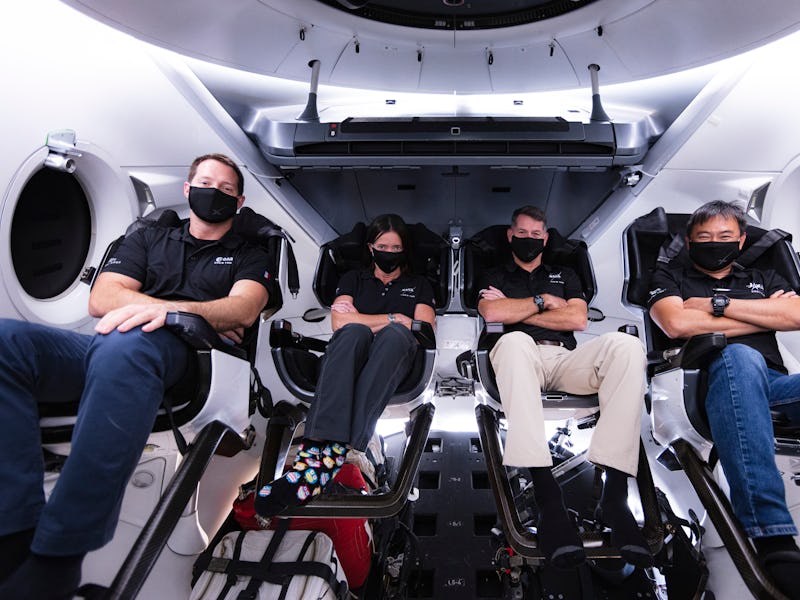Musk Reads: SpaceX Crew Dragon teams prepare for launch
SpaceX Crew Dragon teams get ready to fly again and the Starship gets its wings. How is Musk's Tesla Roadster doing in space?

SpaceX Crew Dragon teams get ready to fly again and the Starship gets its wings. How is Musk’s Tesla Roadster doing in space? It’s Musk Reads: SpaceX Edition #205.
A version of this article appeared in the “Musk Reads” newsletter. Sign up for free here.
Musk quote of the week
“Starship SN8 with rear body flaps”
- Read more about SpaceX’s under-development rocket.
SpaceX
It was a big week for the SpaceX Starship. The company shared a video of the vacuum Raptor engine completing a full-duration test fire, the first time the company has released video of the vacuum variant in action. Musk also shared an image of the “SN8” Starship prototype complete with motor-driven rear body flaps. The team plans to add a nose cone and front flaps to the prototype next week before moving on to complete an “SN9” prototype next month. The next flight is now expected to reach around 50,000 feet in the air. Images also emerged of the Super Heavy prototype, which will act as the booster for the final ship. The Starship and Super Heavy are expected to power SpaceX’s most ambitious missions, including a trip around the Moon and a city on Mars. Read more.
NASA is set to work with SpaceX to launch the Interstellar Mapping and Acceleration Probe, which will be used to study the solar system’s heliosphere that protects it from external radiation. The mission is expected to launch in October 2024 on a Falcon 9 rocket – which could find itself superseded at that point by the Starship. Read more.
What’s next for SpaceX: SpaceX is set to launch the 13th batch of Starlink satellites at an as-yet-undetermined time after the firm stood down Monday’s launch due to weather. The mission is set to lift off from Space Launch Complex 40 at the Cape Canaveral Air Force Station in Florida.
In other Musk news…
- Tom Cruise is expected to launch into space in October 2021 as part of Axiom Space’s Crew Dragon mission, NME reported last week. He will be joined by director Doug Liman and NASA astronaut Michael Lopez-Alegria. Liman and Cruise are expected to use the trip to shoot a film on board the International Space Station. The mission has one seat remaining.
- The “Crew–1” team has received its license to fly, NASA astronaut Victor Glover wrote on Twitter last week. Glover will be joined by NASA astronauts Shannon Walker and Michael Hopkins, as well as Japan Aerospace Exploration Agency astronaut Soichi Noguchi. The mission is set to be the first non-test crewed mission for the SpaceX Crew Dragon, expected to launch no earlier than October 23.
- The United States Air Force has cleared SpaceX to fly two GPS satellites on previously flown Falcon 9 rockets, Aviation Week reporter Irene Klotz wrote on Twitter last week. The move is expected to save $26 million for each flight.
Musk Reads mailroom
Charles Cleveland writes:
It looks like March and April of 2021 that Starman and his Roadster will by close to Earth. Wouldn’t be great if Elons Starspace could be sent up and recover it and bring it back to Earth. He could charge the battery and drive it away, what could be a greater advertisement for Tesla and his SpaceX company.
It would be fascinating to see what sort of state the car is in now! The website Where is Roadster estimates the car is around 6 million miles from Mars and 42 million miles from Earth right now. There’s a lot of unknowns about the state of the car – is it relatively intact? Is it still on course? Is “Starman” still in the driver’s seat? The car will likely have been torn to pieces by radiation in the time since the launch, but a Starship mission to capture the wreckage would be an impressive display.
Victor Sasson writes:
Is there really an idea to shower wifi down to all people on the planet?
Not quite, although a question in last week’s Musk Reads may have given that impression. SpaceX’s Starlink would beam a connection down to a specially designed ground terminal, which would connect with a wifi router to provide internet access. A direct wifi signal would be impractical for a number of reasons, the main one being distance. Researcher Ermanno Pietrosemoli set a world record in 2007 for beaming wifi over 382 kilometers, which still wouldn’t quite reach the Starlink satellites 550 kilometers into the sky.
Got any comments or queries? Don’t forget to send them over to muskreads@inverse.com.
Photo of the week
The European Space Agency’s Thomas Pesquet is pictured training with the rest of the “Crew–2” team, who will fly on the SpaceX Crew Dragon’s second non-test mission in spring 2021. The Japan Aerospace Exploration Agency will be sending Akihiko Hoshide, while NASA will be sending astronauts Shane Kimbrough and Megan McArthur.
Thomas Pesquet in the Crew Dragon training.
Got any photos or videos you’d like to share? Feel free to send them over to muskreads@inverse.com.
The ultra-fine print
This has been Musk Reads: SpaceX Edition #205, the weekly rundown of essential reading about futurist and entrepreneur Elon Musk. I’m Mike Brown, an innovation journalist for Inverse.
- Email me directly at mike.brown@inverse.com and follow Inverse on Twitter @inversedotcom. Follow me on Twitter @mikearildbrown.
- Got any comments or queries? Don’t forget to send them over to muskreads@inverse.com.
What did you think of today’s stories? Hit reply to this email to let us know. Thanks for reading!
A version of this article appeared in the “Musk Reads” newsletter. Sign up for free here.